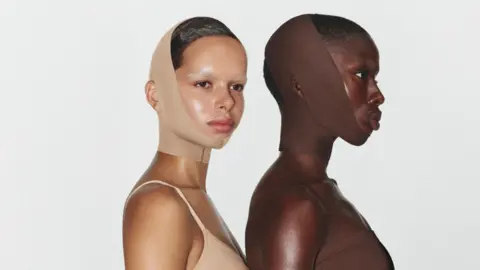The phenomenon of beauty standards and products designed to conform to these ideals continually stirs debate, especially when driven by influential figures like Kim Kardashian. Her recent launch of face shapewear through her brand Skims has garnered both attention and criticism. Dubbed as a “must-have” for achieving a defined jawline, this product sells for approximately £52 and promises the benefits of a sculpted face while sleeping, thrusting it into the world of beauty trends that many consider questionable.
The emergence of Skims’ face wrap is anchored in a broader cultural context where various “beauty rituals” proliferate on platforms like TikTok. Users participate in “morning shed” videos, showcasing their post-sleep skincare routines while donning silicone masks and mouth tape. These practices played a role in normalizing extreme beauty regimens, demanding readers to question where self-care ends and performative beauty begins.
Kardashian’s shapewear seems to capitalize on these trends, aiming to appeal to younger generations, particularly Gen Z and millennials, as noted by beauty expert Laura Porter. The marketing strategies behind Skims frequently utilize aspirational imagery featuring young, attractive models, reinforcing the notion that beauty must be meticulously crafted. The immediate sellout of the product upon its release further emphasizes the eagerness of consumers to embrace these trends — even ones as drastic as wearing a constraining mask while sleeping.
Despite the excitement surrounding the product, the influence of such trends raises critical concerns. Critics argue that these beauty ideals undermine natural beauty and create unrealistic expectations. Porter highlights that compression wraps targeting specific body parts, like the jawline, propagate the idea that one must continually reshape their appearance to be deemed acceptable. Analogous sentiments were echoed by proponents of body positivity, such as Chloe Thomas, who emphasized that these products could counterproductive to progress in body image acceptance.
Medical professionals weighed in on the efficacy of the face wrap. Dr. Anna Andrienko, an aesthetic doctor, clarifies that while these types of garments may produce temporary effects — like de-puffing due to pressure — they cannot achieve lasting results. Misleading claims about the inclusion of collagen yarn, which supposedly enhances skin quality, have also been scrutinized. The reality is that such fabrics do not guarantee measurable benefits, leading to skepticism regarding the science behind the product.
Porter’s assessment suggests that many of the beauty trends emerging through social media may prioritize visual impact over genuine, evidence-based skincare practices. This phenomenon is often magnified through influencer promotions, with claims of overnight transformations resonating powerfully among impressionable audiences. Skewing into the realm of performative beauty, these rituals are designed not for practical skincare but for capturing the most aesthetically pleasing online moments.
Furthermore, societal implications of these products extend beyond individual consumers. As body positivity advocates like Michelle Elman point out, such beauty standards generate harmful perceptions and contribute to declining self-esteem. The concept of needing to look perfect even during sleep accentuates insecurities that many individuals harbor regarding their natural features.
In summary, Kim Kardashian’s foray into facial shapewear brings into sharp focus the intersection of beauty ideals, influencer culture, and the potential psychological implications of these trends. While some may celebrate innovations in the realm of non-invasive contouring, critics highlight the pressing need to challenge and rethink the narratives that prioritize aesthetic perfection at the expense of genuine self-acceptance. As we navigate this evolving landscape, it remains essential to discern between innovative beauty solutions and those designed to conform to perhaps unattainable and potentially harmful standards.












